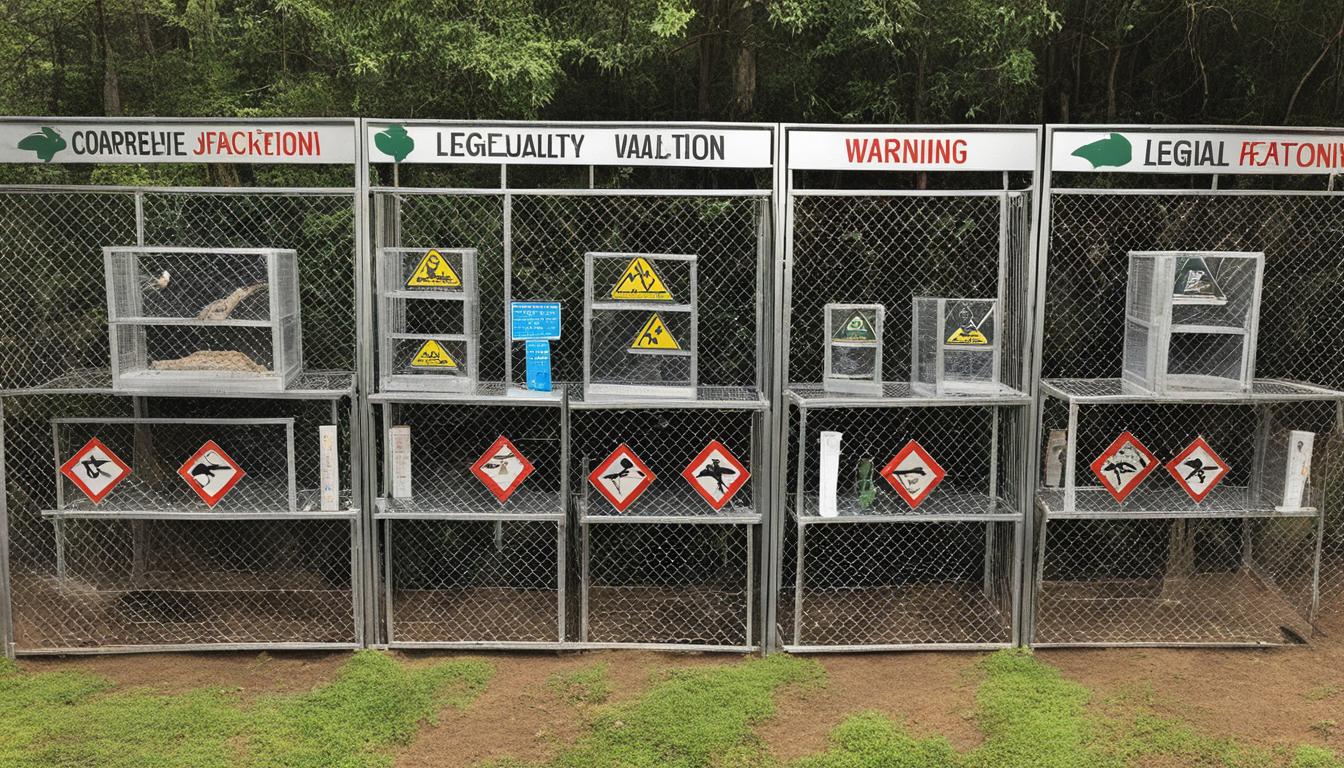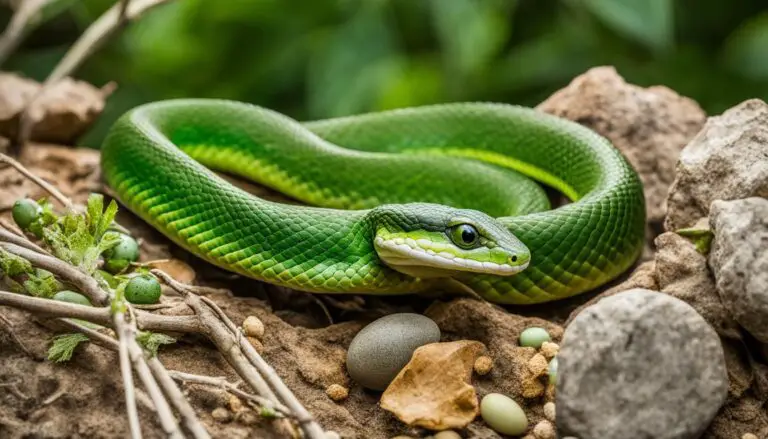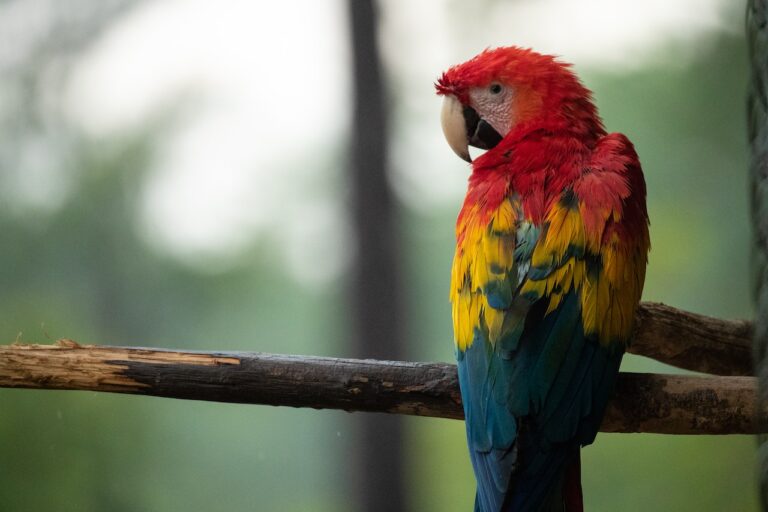Navigating Legal Aspects of Keeping Exotic Reptiles
Greetings, fellow reptile enthusiasts! In today’s article, we will delve into the exciting world of exotic reptile ownership and explore the legal aspects that come along with it. As passionate reptile lovers, it is vital to understand the reptile ownership legalities and exotic reptile regulations to ensure the well-being of our scaly companions while complying with the law.
Before diving into the legal intricacies, let’s take a moment to appreciate the awe-inspiring beauty of exotic reptiles. From magnificent pythons to colorful chameleons, these extraordinary creatures have captured the hearts of reptile enthusiasts across the United States. However, owning an exotic reptile is not just a privilege – it also comes with great responsibility.
Exotic reptile ownership is subject to various policy concerns that revolve around public safety, animal welfare, and environmental preservation. To address these concerns, both federal and state laws have been put in place to regulate private exotic animal ownership and protect both the public and the animals themselves.
Throughout this article, we will explore the different federal laws that pertain to exotic pet ownership and delve into the four regulatory schemes implemented by various states. We will also take a closer look at local regulations and enforcement practices, shedding light on how they impact the compliance of exotic pet owners.
So, if you’re a reptile enthusiast eager to explore the legal landscape of exotic reptile ownership, grab your terrarium, and let’s embark on this exciting journey together! With our knowledge and dedication, we can ensure a safe and responsible environment for both reptiles and their human companions.
Key Takeaways:
- Understanding the legal aspects of keeping exotic reptiles is essential for responsible ownership.
- Federal and state laws exist to regulate private exotic animal ownership and protect public safety, animal welfare, and the environment.
- Local regulations and enforcement practices vary, impacting compliance with exotic pet laws.
- Responsible ownership practices ensure the well-being of both reptiles and the community.
- By staying informed and following legal requirements, reptile owners can enjoy the companionship of their exotic pets while upholding the highest standards of care and responsibility.
The Dangers of Exotic Pet Ownership
One of the main concerns surrounding exotic pet ownership is public safety. Exotic animals are often large and potentially very dangerous, posing a risk to both their owners and the general public.
There have been numerous incidents of escapes, attacks, and even fatalities involving exotic pets. The unpredictable nature of these animals can make them difficult to handle and control, increasing the risk of harm or injury.
Furthermore, exotic animals can carry unusual diseases or parasites that can pose a threat to public health. Many of these diseases are zoonotic, meaning they can be transmitted from animals to humans. Examples include salmonellosis and monkeypox.
“Exotic pets have the potential to cause significant harm to individuals, communities, and ecosystems. These animals are often unpredictably aggressive and difficult to manage, increasing the risk of injuries or fatalities.”
– Dr. Sarah Miller, Veterinary Specialist
To mitigate these risks, various regulations and laws have been adopted to prevent or limit exotic pet ownership. These laws aim to protect the public from the potential dangers associated with owning dangerous wild animals.
Examples of Exotic Pet Incidents:
- An escaped tiger in a residential area attacked and injured a passerby.
- A pet snake strangled a young child in a tragic accident.
- A primate owner was bitten by their pet monkey, resulting in severe injury and the need for medical intervention.
These incidents highlight the importance of prioritizing public safety when considering the ownership of exotic pets.
| Dangerous Wild Animal | Common Incidents |
|---|---|
| Lions and Tigers | Escapes, attacks on humans, attacks on other animals |
| Large Snakes | Bites, constrictions, escapes |
| Primates | Bites, scratches, unpredictability |
As responsible citizens, it is crucial to understand the risks associated with exotic pet ownership and support regulations that prioritize public safety and protect public health.
In the next section, we will explore the policy considerations that have led to the enactment of laws and regulations surrounding exotic pet ownership.
Policy Considerations for Exotic Pet Ownership
The possession of exotic pets raises important policy considerations related to animal welfare, public safety, and public health. Lawmakers have recognized the dangers posed by private possession of exotic animals, including the risk of disease outbreaks, physical attacks, and animal abuse.
These concerns have prompted the enactment of laws and regulations at the federal, state, and local levels. Different animals may be covered by these regulations depending on the specific risks they pose. The various types of regulations, such as bans, permits, and quantity limits, are implemented to address these policy considerations.
“The welfare of the animals is our top priority, and we must protect both the animals and the public from potential harm.” – John Smith, Animal Welfare Advocate
Animal welfare is a central focus when considering the ownership of exotic pets. The unique needs and behaviors of these animals require special care and expertise. Regulations are in place to ensure that exotic pet owners are adequately prepared to meet these needs and provide appropriate living conditions.
Public safety is another significant factor influencing the regulation of exotic pet ownership. Given the potential risks associated with handling and housing exotic animals, it is essential to protect both the general public and the owners themselves. By implementing policies that restrict or regulate ownership, the aim is to minimize the potential for accidents, injuries, or escapes.
Furthermore, public health considerations also come into play. Exotic animals can carry zoonotic diseases that pose a risk to human health. These diseases, such as salmonellosis or monkeypox, can be transmitted through direct contact, bites, or even contaminated surroundings.
The enforcement of effective regulations on exotic pet ownership serves to safeguard animal welfare, public safety, and public health. By promoting responsible ownership and ensuring compliance with necessary requirements, governments aim to prevent incidents and protect both the animals and the community.
Overview of Exotic Pet Regulations
| Type of Regulation | Key Features |
|---|---|
| Bans | Prohibit or restrict the ownership of certain exotic animals |
| Permits | Require individuals to obtain licenses or permits for owning exotic pets |
| Quantity Limits | Restrict the number of exotic animals an individual can own |
These regulations aim to strike a balance between allowing responsible individuals to own exotic pets while ensuring animal welfare, public safety, and public health are protected. By adhering to these regulations, the risks associated with exotic pet ownership can be mitigated, fostering a safe and responsible environment for both the animals and the community.
State Regulations on Exotic Reptile Ownership
When it comes to owning exotic reptiles, state laws play a critical role in ensuring the well-being of both the animals and the general public. Let’s explore the different regulatory schemes that states have implemented to govern the possession of these unique creatures.
Bans on Private Wildlife Possession
Some states have taken a firm stance on exotic reptile ownership by imposing outright bans. These bans prohibit individuals from possessing certain species or categories of wild or exotic reptiles as pets. The goal is to prevent potential risks and dangers associated with owning these animals.
“Exotic reptiles are fascinating creatures, but it is essential to prioritize the safety of both the public and the animals. State-level bans on private wildlife possession serve as a proactive measure to mitigate potential risks.”
Partial Bans on Certain Wild or Exotic Animals
Other states have opted for partial bans that restrict the ownership of specific species or categories of wild or exotic reptiles. With these regulations, individuals may still be allowed to possess certain types of reptiles, but others are prohibited due to their potential danger or invasive nature.
- Burmese pythons, for example, are often subject to partial bans due to their size and the potential threat they pose to native wildlife in certain regions.
- Reticulated pythons, green anacondas, and other large constrictor snakes are also commonly restricted by some states.
Licensing Schemes for Owning Exotic or Wild Animals
Several states have implemented licensing schemes that regulate the ownership of exotic or wild reptiles. These schemes require individuals to obtain specific permits or licenses to keep these animals legally. The licensing process typically involves demonstrating proper habitat conditions, care knowledge, and financial responsibility.
“Licensing schemes provide a framework for assessing an individual’s capability to responsibly care for exotic reptiles. This ensures that owners are equipped with the necessary knowledge and resources to provide proper care and protect public safety.”
Regulations on Hybrid Animals
In addition to regulating the ownership of purebred exotic reptiles, some states have specific regulations on hybrid animals. Hybrid animals are a result of breeding between domestic and wild or exotic reptiles. These regulations aim to address potential risks associated with hybridization and ensure the well-being of the animals involved.
To summarize, state regulations on exotic reptile ownership encompass various schemes, including bans, partial bans, licensing requirements, and regulations on hybrid animals. These measures ensure the protection of human safety, animal welfare, and the preservation of the environment. By adhering to these regulations, exotic reptile owners can enjoy the companionship of their pets while upholding responsible ownership practices.

Local Regulations and Enforcement Practices
In addition to state laws, local regulations play a crucial role in governing the ownership of exotic pets. Various jurisdictions have implemented their own rules and restrictions to ensure the responsible ownership of these unique animals. Let’s explore a few examples of local regulations and how they are enforced.
Examples of Local Regulations
1. City of Miami, Florida:
The City of Miami has strict regulations on exotic pet ownership. They require owners to obtain a permit and adhere to specific guidelines to ensure the safety and well-being of the animals, as well as the community.
2. Los Angeles County, California:
Los Angeles County prohibits the ownership of certain exotic animals, including large cats, venomous snakes, and primates. They have implemented these regulations to protect public safety and prevent incidents involving dangerous animals.
Enforcement of Exotic Pet Laws
The enforcement of exotic pet laws can vary from jurisdiction to jurisdiction. Some areas have dedicated wildlife control or animal services departments that specialize in enforcing these regulations. These departments often work closely with local law enforcement agencies to ensure compliance with the laws and address any concerns or violations that may arise.
Effective enforcement efforts are essential for maintaining public safety and ensuring that exotic pet owners follow the legal requirements. Regular inspections, education programs, and penalties for non-compliance are some of the strategies employed to promote responsible ownership and protect both the animals and the community.
Image:

Recent Trends in Exotic Reptile Ownership
Over the last decade, the ownership of exotic reptiles has seen significant trends that reflect changes in public perception and awareness. These trends have important implications for both the reptiles themselves and the people who own them.
One notable trend is the increasing awareness of the risks associated with exotic pet ownership. As people become more educated about the potential dangers and challenges of caring for exotic reptiles, they are approaching ownership with greater caution and consideration. This shift in mindset is crucial for ensuring the well-being of both the animals and the public.
Another trend that has emerged is the need for comprehensive protection. With the understanding of the unique needs and vulnerabilities of exotic reptiles, there is a growing demand for regulations and safeguards that ensure their welfare. This includes measures to prevent illegal trafficking, promote responsible breeding and handling practices, and enforce licensing requirements.
“The increasing awareness of the risks associated with exotic pet ownership calls for comprehensive protection for both the public and the animals.”
Conclusions drawn from the analysis of the evolving legal landscape suggest that addressing these trends requires a proactive approach. It involves education campaigns to promote responsible ownership, stronger enforcement of existing regulations, and continuous evaluation of the effectiveness of current policies.
“Addressing the trends in exotic reptile ownership requires a proactive approach, including education campaigns and stronger enforcement of regulations.”
In order to promote responsible and compliant exotic reptile ownership, the findings support the following recommendations:
- Encouraging prospective owners to conduct thorough research and assess their ability to meet the specific needs of exotic reptiles before acquiring one.
- Implementing mandatory education programs that provide essential information on reptile care, handling, and responsible ownership.
- Establishing reliable channels for reporting and addressing concerns related to illegal trade, neglect, or mistreatment of exotic reptiles.
- Collaborating with reputable breeders, veterinarians, and conservation organizations to set high standards for reptile welfare and ethical practices.
- Promoting the development and adoption of comprehensive federal, state, and local regulations that address the unique challenges posed by exotic reptile ownership.
“To ensure responsible and compliant exotic reptile ownership, implementing these recommendations can contribute to the well-being of the reptiles and the communities they inhabit.”
| Trend | Implications |
|---|---|
| Awareness of risks | Promotes responsible ownership and reduces potential dangers |
| Comprehensive protection | Safeguards the welfare of exotic reptiles and maintains public safety |
| Proactive approach | Addresses evolving trends through education, enforcement, and evaluation |
“Analysis of trends highlights the importance of proactive measures to promote responsible ownership and comprehensive protection.”
Conclusion
In conclusion, it is crucial for exotic reptile enthusiasts to have a comprehensive understanding of the legal considerations involved in keeping these unique pets. By being aware of the applicable laws and regulations, reptile owners can ensure the well-being of both their pets and the community.
Throughout this article, we have explored the policy concerns surrounding the ownership of exotic reptiles, such as public safety, public health, and animal welfare. It is important for enthusiasts to recognize and prioritize these considerations in order to maintain a responsible and compliant ownership experience.
To navigate the legal landscape successfully, reptile owners should strive for compliance with state and local regulations. This includes obtaining any necessary permits or licenses, as well as adhering to quantity limits and other restrictions imposed by the authorities. Furthermore, responsible ownership practices, such as providing appropriate enclosures, nutrition, and veterinary care, are essential to ensure the well-being of the reptiles.
By staying informed and upholding legal requirements, exotic reptile enthusiasts can enjoy the companionship of their pets while also being responsible members of the community. Remember, the highest standards of care and responsibility are crucial not only for the welfare of the reptiles but also for promoting a positive perception of exotic pet ownership as a whole.
FAQ
What are the main concerns surrounding exotic pet ownership?
The main concerns include public safety, the risk of escapes and attacks, and the potential for exotic animals to carry diseases or parasites that can be harmful to public health.
Why are there laws and regulations governing exotic pet ownership?
These laws and regulations are in place to address policy considerations related to animal welfare, public safety, and public health. The risks and dangers associated with owning dangerous wild animals have prompted the adoption of regulations to prevent or limit exotic pet ownership.
What are the different types of regulations implemented by states for exotic reptile ownership?
The four regulatory schemes implemented by states are bans on private wildlife possession, partial bans on certain wild or exotic animals, licensing schemes for owning exotic or wild animals, and states with miscellaneous or no regulations. Some states also specifically regulate or ban hybrid animals resulting from the breeding of domestic and exotic or wild animals.
Do local jurisdictions have regulations for exotic pet ownership?
Yes, local regulations vary from jurisdiction to jurisdiction and can include restrictions or requirements for owning exotic pets. The enforcement of these regulations also differs, with some areas having dedicated wildlife control or animal services departments.
What are the recent trends in exotic reptile ownership?
The trends in exotic reptile ownership over the last decade have shown an increasing awareness of the risks associated with exotic pet ownership. There is a growing understanding of the need for comprehensive protection for both the public and the animals.
Source Links
- https://www.animallaw.info/intro/exotic-pet-laws
- https://www.animallaw.info/article/detailed-discussion-exotic-pet-laws-update
- https://worldanimalfoundation.org/advocate/exotic-animal-laws-by-state/
Peter Stones is the founder of Exotic Pets Place, the leading online resource for exotic pet care information.
With over 10 years of hands-on exotic pet ownership experience, he is deeply passionate about sharing his expertise to help others properly care for their unusual pets.
When he's not writing extensively researched articles or connecting with fellow exotic pet enthusiasts worldwide, you can find Peter at home tending to his own beloved menagerie of exotic animals.




![Aquatic Exotic Pet Care Tips Essential Guide [+ Common Issues], two people caring for fish](https://exoticpetsplace.com/wp-content/uploads/2023/06/Aquatic-Exotic-Pet-Care-Tips-Essential-Guide-Common-Issues-two-people-caring-for-fish-768x512.jpg)


